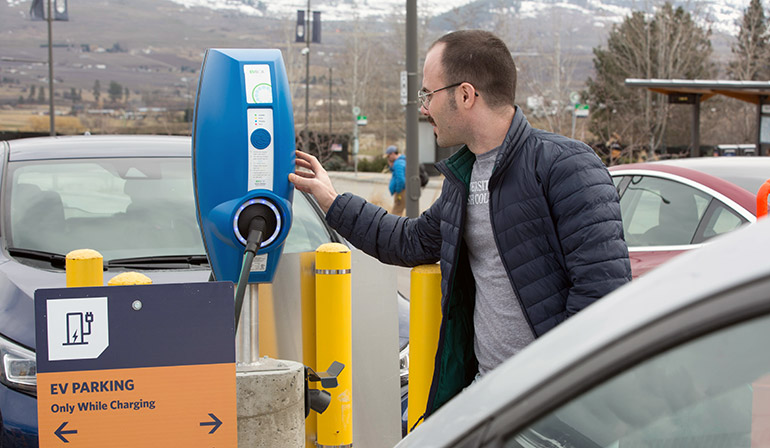
Majid Moradzadeh, doctoral student in power engineering, poses in front of an electric vehicle power station at UBCO.
Fossil fuels a key part of keeping plug-in vehicles on the road
New research from UBC Okanagan aims to improve the efficiency and cost associated with charging electric vehicles.
Despite the perception that electric vehicles are environmentally friendly, the reality is that most of the electricity used to power these vehicles is generated by fossil fuels, says Majid Moradzadeh, a doctoral student at UBCO's School of Engineering.
"Renewable energy sources are currently a small part of the larger electricity generation system," explains Moradzadeh. "Due to the variability of electricity output by these renewable sources, energy storage systems are vital to ensuring continuous power is available."
In the first study of its type, Moradzedeh developed a comprehensive planning method specifically for fast-charging stations. The method considers a wide range of technical and operation features of renewable resources, energy storage systems and the electric vehicles' charging demand. The goal is to create a fast-charging station at minimal optimum cost, while meeting its performance requirements.
The proposed cost-efficient and sustainable fast-charging station prioritizes the source of its power whether it be renewable, from storage or the main distribution system. It also mitigates the adverse impacts of charging electric vehicles on the distribution network.
"The key to building sustainable electric vehicle infrastructure is to ensure that it is economical," says Morad Abdelaziz, an assistant professor of electrical engineering at UBCO. "By developing a planning method, we are building a roadmap towards fast-charging stations that can seamlessly target renewable sources of power instead of relying on existing fossil-fuel-powered sources."
According to Moradzedeh, the findings will be used by governments to help establish future charging stations while highlighting reduced peak power usage and opportunities to postpone the distribution system upgrade.
The findings were published in the journal IEEE Transactions on Transportation Electrification.
About UBC's Okanagan campus
UBC's Okanagan campus is an innovative hub for research and learning founded in 2005 in partnership with local Indigenous peoples, the Syilx Okanagan Nation, in whose territory the campus resides. As part of UBC-ranked among the world's top 20 public universities-the Okanagan campus combines a globally recognized UBC education with a tight-knit and entrepreneurial community that welcomes students and faculty from around the world in British Columbia's stunning Okanagan Valley.






